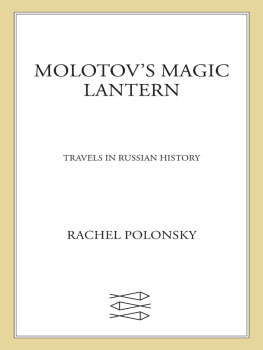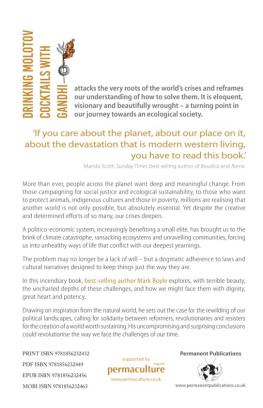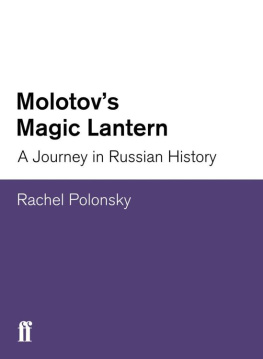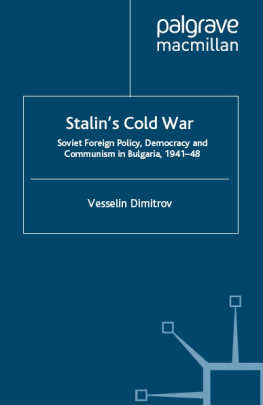MOLOTOV
ALSO BY GEOFFREY ROBERTS
The History and Narrative Reader (2001) (editor)
Ireland and the Second World War (2000) (coedited with Brian Girvin)
The Soviet Union and the Origins of the Second World War (1995)
The Soviet Union in World Politics: Coexistence, Revolution, and
Cold War, 19451991 (1998)
Stalin: His Times and Ours (2005) (editor)
Stalins Wars: From World War to Cold War, 19391953 (2006)
The Unholy Alliance: Stalins Pact with Hitler (1989)
Victory at Stalingrad: The Battle That Changed History (2002)
ALSO IN THE SHAPERS OF INTERNATIONAL HISTORY SERIES
Edited by Melvyn P. Leffler, University of Virginia
Dean Acheson and the Creation of an American World Order
Robert J. McMahon (2009)
Vladimir Putin and Russian Statecraft
Allen C. Lynch (2011)
ADDITIONAL FORTHCOMING TITLES IN THE SHAPERS OF INTERNATIONAL HISTORY SERIES
Deng XiaopingWarren Cohen
Fidel CastroPiero Gleijeses
George KennanFrank Costigliola
Henry KissingerJeremi Suri
Ho Chi MinhRobert K. Brigham
Jimmy CarterNancy Mitchell
Konrad AdenauerRonald Granieri
Madeleine AlbrightPeter Ronayne
Mikhail GorbachevRobert English
Robert McNamaraFredrik Logevall
Ronald ReaganNancy Tucker
Yasser ArafatOmar Dajani
Zhou EnlaiChen Jian
MOLOTOV
STALINS COLD WARRIOR
GEOFFREY ROBERTS
SHAPERS OF INTERNATIONAL HISTORY SERIES
Edited by Melvyn P. Leffler, University of Virginia

Copyright 2012 by Potomac Books, Inc.
Published in the United States by Potomac Books, Inc. All rights reserved. No part of this book may be reproduced in any manner whatsoever without written permission from the publisher, except in the case of brief quotations embodied in critical articles and reviews.
Library of Congress Cataloging-in-Publication Data
Roberts, Geoffrey, 1952
Molotov: Stalins cold warrior / Geoffrey Roberts.1st ed.
p. cm.
Includes bibliographical references and index.
ISBN 978-1-57488-945-1 (hardcover: alk. paper)
ISBN 978-1-61234-429-4 (electronic edition)
1. Molotov, Vyacheslav Mikhaylovich, 18901986. 2. StatesmenSoviet Union
Biography. 3. Soviet UnionPolitics and government. I. Title.
DK268.M64R63 2011
947.0842092dc23
[B]
2011023384
Printed in the United States of America on acid-free paper that meets the American National Standards Institute Z39-48 Standard.
Potomac Books
22841 Quicksilver Drive
Dulles, Virginia 20166
First Edition
10 9 8 7 6 5 4 3 2 1
In memory of Eduard Mark (19432009)
CONTENTS
ILLUSTRATIONS
MAPS
PHOTOGRAPHS
SERIES EDITORS FOREWORD
by Melvin P. Leffler
As human beings, we are interested in our leaders. What they say and do has a profound impact on our lives. They can lead us into war or help to shape the peace; they can help promote trade and prosperity or sink us into poverty; they can focus on fighting terror or combating disease, or do both, or neither.
We also know that they are not as strong and powerful as they pretend to be. They, too, are enveloped by circumstances that they cannot control. They are the products of their time, buffeted by technological innovations, economic cycles, social change, cultural traditions, and demographic trends that are beyond their reach. But how they react to matters they cannot control matters a great deal. Their decisions accrue and make a difference.
This series focuses on leaders who have shaped international relations during the modern era. It will consider those who were elected to high office and those who were not, and those who led revolutionary movements as well as those who sought to preserve the status quo. It will include leaders of powerful states and those of weak nations who nevertheless had the capacity to influence international events extending well beyond the power of the country they led. This series will deal with presidents and dictators, foreign secretaries and defense ministers, diplomats and soldiers.
The books in the series are designed to be short, evocative, and provocative. They seek to place leaders in the context of their times. How were they influenced by their families, their friends, their class, their status, their religion, and their traditions? What values did they inculcate and seek to disseminate? How did their education and careers influence their perception of national interests and their understanding of threats? What did they hope to achieve as leaders, and how did they seek to accomplish their goals? In what ways and to what extent were they able to overcome constraints and shape the evolution of international history? What made them effective leaders? And to what extent were they truly agents of change?
The authors are experts in their field writing for the general reader. They have been asked to look at the forest, not the trees, to extrapolate important insights from complex circumstances, and to make bold generalizations. The aim here is to make readers think about big issues and important developments, to make readers wrestle with the perplexing and enduring question of human agency in history.
In this book Geoffrey Roberts provides a provocative reassessment of Vyacheslav Mikhailovich Molotov, the foreign minister of the Soviet Union for much of the time from 1939 to 1955. We see Molotov as a deeply committed communist, eager to overthrow the tsar and eradicate an unjust capitalist order, as he perceived it. Molotov aligned himself with Joseph Stalin in the early days of the revolution and became a loyal, efficient, and dedicated assistant. He supported collectivization and rapid industrialization, and willingly engaged in the purges of the mid-and late 1930s. Molotov believed there were enemies who sought to overthrow the new order and they had to be killed. This was the regrettable price that had to be paid in pursuit of a utopian revolution that, in Molotovs view, would ameliorate the human condition. Roberts forces us to ponder such contradictions, contradictions that bedevil the human experience.
He also argues that Molotov mattered. Using new archival materials, Roberts shows that Molotov was an independent thinker, that he often viewed things differently than Stalin, and that he was confident enough of his relationship with the dictator that he could express his views. Of course, once Stalin decided what he wanted to be done diplomatically, Molotov not only went along but also could be relied upon to implement Stalins will with a tenacity and skill that exasperated negotiators and interlocutors.
But Molotov also mattered because after Stalins death in 1953, he championed important changes in Soviet foreign policy. Radically reassessing Molotov, Roberts claims that Molotov never welcomed the Cold War and sought to alter its trajectory as soon as he could. Fearing Germany and hating NATO, Molotov worked tirelessly to shape a pan-European system of collective security, end the Cold War, and unite Europe. He championed what later became known as dtente and launched initiatives that would eventually culminate in the Helsinki Accords of 1975 and the Conference on Security and Cooperation in Europe (CSCE) process.
Next page







